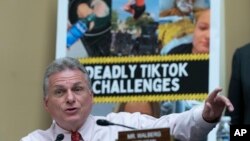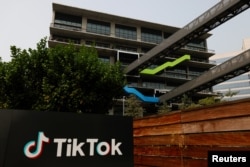A U.S. ban of Chinese-owned TikTok, the country's most popular social media for young people, seems increasingly inevitable a day after the grilling of its CEO by Washington lawmakers from across the political divide.
But the Biden administration will have to move carefully in denying 150 million Americans their favorite platform over its links to China, especially after a previous effort by then-President Donald Trump was struck down by a U.S. court.
TikTok CEO Shou Zi Chew endured a barrage of questions by U.S. lawmakers who made clear their belief that the app best known for sharing jokes and dance routines was a threat to U.S. national security as well as being a danger to mental health.
In a tweet, TikTok executive Vanessa Pappas deplored a hearing "rooted in xenophobia."
With both Republicans and Democrats against him at Congress, Chew must now confront a White House ultimatum that TikTok either sever ties with ByteDance, its China-based owners, or be banned in America.
Bipartisan legislation
A ban will depend on passage of legislation called the RESTRICT ACT, a bipartisan bill introduced in the Senate this month that gives the U.S. Commerce Department powers to ban foreign technology that threatens national security.
When asked about Chew's tumultuous hearing, spokeswoman Karine Jean-Pierre repeated the White House's support of the legislation, which is one of several proposals by Congress to ban or squeeze TikTok.
The sell-or-be-banned order tears up 2.5 years of negotiations between the White House and TikTok to find a way for the company to keep running under its current ownership while satisfying national security concerns.
Those talks resulted in a proposal by TikTok called Project Texas in which the personal data of U.S. users stays in the United States and would be inaccessible to Chinese law or oversight.
But the White House turned sour on the idea after officials from the FBI and the Justice Department said that the vulnerabilities to China would remain.
"It's hard for TikTok to prove a negative. 'No, we're not turning over any data to the Chinese government.' Look at how skeptical our European partners are about U.S. companies where we have a strong legal system," said Michael Daniel, executive director of the Cyber Threat Alliance, a nongovernmental organization dedicated to cybersecurity.
Presently, the White House's preferred solution is that TikTok sever ties with ByteDance either through a sale or a spinoff.
"My understanding is that what has been … insisted on is the divestment of TikTok by the parent company," U.S. Secretary of State Antony Blinken said Thursday.
Impossible to achieve?
But that option is riddled with difficulties, with many experts saying that TikTok cannot function without ByteDance, which develops the app's industry-leading technology.
"ByteDance's ownership of TikTok and the golden jewel algorithm at the center of this security debate is a hot-button issue that will not necessarily be solved just by a spinoff or sale of the assets," said Dan Ives of Wedbush Securities.
Proving the point, China has ruled out giving the go-ahead for a TikTok sale, citing its own laws to protect sensitive technology from foreign buyers.
That leaves a ban of TikTok that would undeniably benefit domestic rivals Instagram, Snapchat and YouTube.
One unknown is whether a death sentence for TikTok will cost Washington politically among voters.
Through a ban, "a democracy will be taking steps that impede the ability of young Americans to express themselves and earn a livelihood," said Sarah Kreps, professor of government at Cornell University.
Does the lawmakers' grilling of the TikTok CEO minimize the danger of political blowback?
"I want to say this to all the teenagers ... who think we're just old and out of touch," said Representative Dan Crenshaw, a Republican. "You may not care that your data is being accessed now, but there will be one day when you do care about it."





